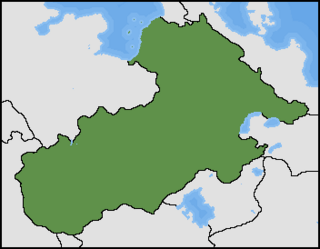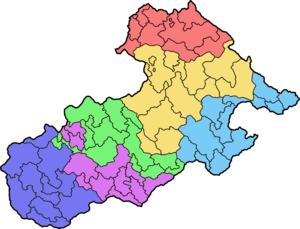Bakyern: Difference between revisions
No edit summary |
No edit summary |
||
| Line 94: | Line 94: | ||
|population_density_sq_mi = | |population_density_sq_mi = | ||
|population_density_rank = | |population_density_rank = | ||
|GDP_PPP = | |GDP_PPP = | ||
|GDP_PPP_rank = | |GDP_PPP_rank = | ||
|GDP_PPP_year = | |GDP_PPP_year = | ||
|GDP_PPP_per_capita = | |GDP_PPP_per_capita = | ||
|GDP_PPP_per_capita_rank = | |GDP_PPP_per_capita_rank = | ||
|GDP_nominal = {{increase}} $5.480 Trillion | |GDP_nominal = {{increase}} $5.480 Trillion | ||
Revision as of 00:41, 12 January 2021
This article is incomplete because it is pending further input from participants, or it is a work-in-progress by one author. Please comment on this article's talk page to share your input, comments and questions. Note: To contribute to this article, you may need to seek help from the author(s) of this page. |
Bak Confederation Laakyar Valötta (Bakyernian) | |
|---|---|
| Motto: Freedom or Death Placeholder | |
| Anthem: A Hymn of Unity | |
 | |
| Capital | Saatöl (Executive) Kalvat (Legislative & Judicial) |
| Official languages | Bakyernian |
| Recognised national languages | Bakyernian |
| Ethnic groups | Bakyernian Kaampite Sivuk-Modov |
| Religion | Roman Catholicism Samiism Weudalism |
| Demonym(s) | Bak Bakyernian |
| Government | Confederate Semi-Direct Democracy |
• Chairman | Kal Strassman |
• National Council | Ivak Paar Ann Baalmay Jon Graf |
| Legislature | Confederate Congress |
| Council of Governates | |
| Council of Representatives | |
| Area | |
• | 2,058,726 km2 (794,879 sq mi) |
| Population | |
• 2020 census | |
• Density | 47.37/km2 (122.7/sq mi) |
| GDP (nominal) | estimate |
• Total | |
• Per capita | |
| Gini | 30.3 medium |
| HDI | 0.938 very high |
| Currency | Bak Gild (bg) |
| Time zone | UTC-4 |
| Driving side | right |
| Calling code | +4 |
| Internet TLD | .bk |
The Bak Confederation (Bakyernian: Laakyar Valötta) or more commonly known as Bakyern, is a sovereign state in Anteria located in the eastern region of the Thuadian continent. It's a member state of the Anterian World Assembly and Sekidean Union. The administrative levels of Bakyern is divided into governates, which are unified by 6 respective cantons. As of 2020, the latest census has reported that Bakyern has a population of 97 million people. Bakyern has a land area of 2.058 million square kilometers, making Bakyern one of Anteria's largest nations. Bakyern is bordered by Grafenland to the south-east, Junterland to the east, Zhousheng to the south west, Nortence to the north, and Cocuryeo to the west.
Bakyern is considered a developed country due to its high human development and powerful and developed economy. The larger economic sectors of Bakyern are located in the eastern governates and cantons. A lot of Bakyern relies on a a service economy. Bakyern has a strong banking economic sector which contributes a lot into Bakyern's economy in the southern and western provinces. Bakyern is estimated to be the most economically powerful country in the region Bakyern is in place, with Gabrielland being an economic rival. Municipalities in the east have managed to maintain a powerful banking sector. In the southern municipalities, the manufacturing sector is largely maintained over there, with Bak manufacturers having priorities in automobiles and electronics. Even though the Bak economy is service based, the agricultural sector still plays a big role. With western municipalities being the hub for Bakyern's agricultural sector and business.
Geography
...
Politics
Government
...
Healthcare
...
Law
...
Administrative Division
Bakyern is divided administratively to 6 first level regional cantons that are then divided into Governates. The Cantons have their own respective legislative bodies and are able to create their own constitutions and laws. The two capitals of Bakyern have their own administrative divisions, called Administration Districts. In the western governates and cantons, administrative regions are politically divided mainly by ethnic or linguistical lines already set.
Economy
...
Culture
Bakyern is ethnically diverse, with a divide between ethnic groups especially around the borders of foreign bordering countries. The current dominating and majority ethnic group are Bakyernians. The majority of east Bakyern is inhabited by Germanic ethnic groups and Bakyernians while in the south and west ethnicity becomes more diverse.
Religion
The majority religion in Bakyern as of currently is Samiism, a culture which has originated from Aleni. While an obvious majority of the population is Samiist, Roman Catholicism comes in close with a difference of less than 13%. Bakyern does not practice an official religion due to ethnic diversity and religious diversity, but have shown more favor towards Weudalism, a native religion, for symbolism (such as the raccoon as national animal.)
Earlier in the 20th Century, Weudalism used to be the majority and ruling religion in Bakyern, but this has changed in favor of Samiism especially during a time period in the 50's.
Popular Media
Entertainment
Entertainment in Bakyern is heavily driven towards television and the internet. The current most watched broadcasting channel is the KW Network with SaatTV right behind. The majority of Bak entertainment is animated rather than live-action, due to producers considering animation to be more effective and cheaper than live-action. For this reason, an obvious majority of movies and TV shows in Bakyern are animated rather than live-action. A clear majority of films in Bakyern aren't political and aren't supposed to be nationalist but critics have noticed the undertone of nationalism, anti-socialism, and pro-Wenelism.
Literature
Literature has been an important part of Bak media, with many Bakyernian literature being infamous and known. Many pieces of Bak literature have included drama, war, politics, and poetry. Bak literature had a lot of popularity outside of Bakyern during the late 19th Century and early 20th Century as Bakyern begun to open up more to the world. A lot of Bak literature had to do with particulary politics and philosophy, which became a breeding ground for Bak ideologies such as Wenelism and Lauterbachism.


